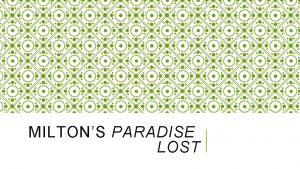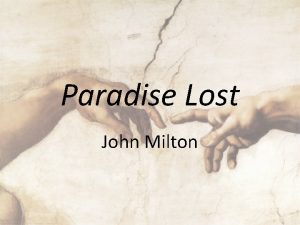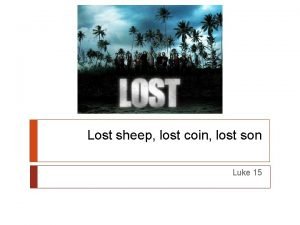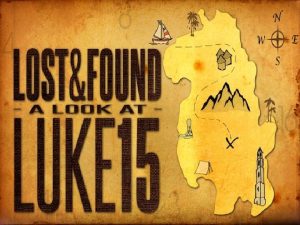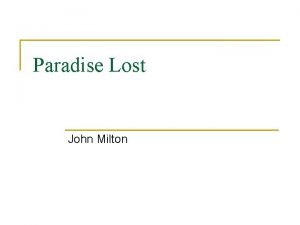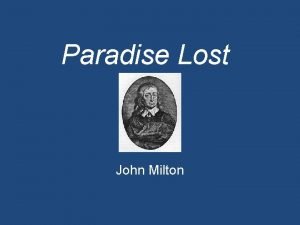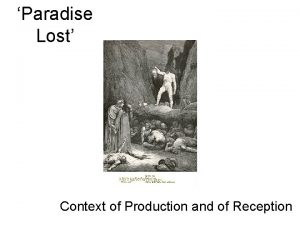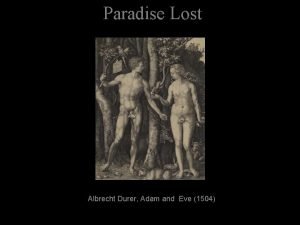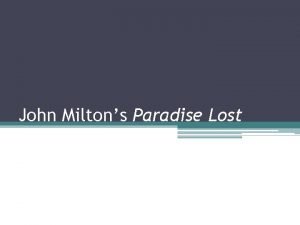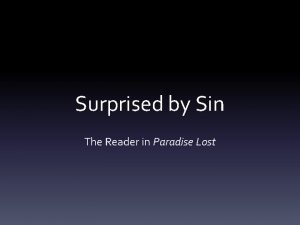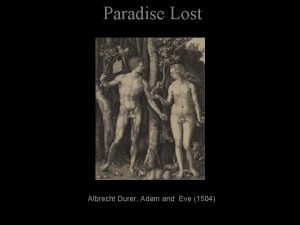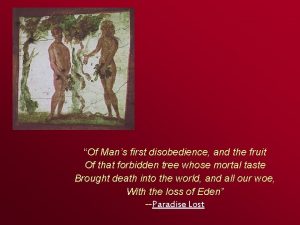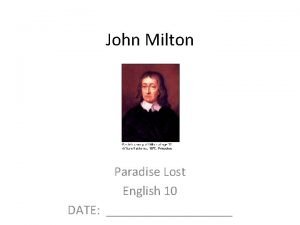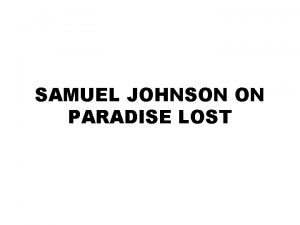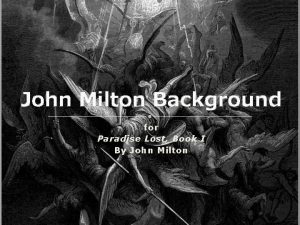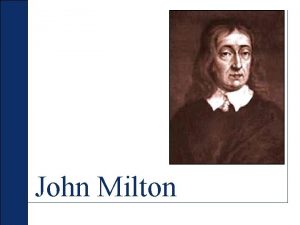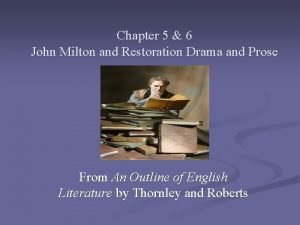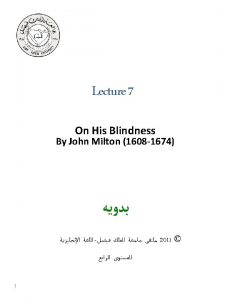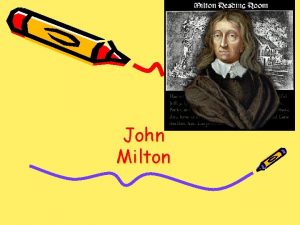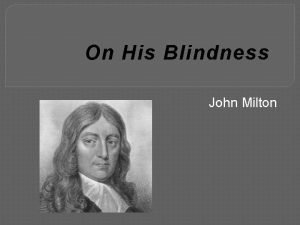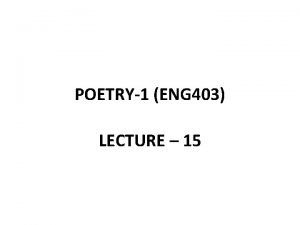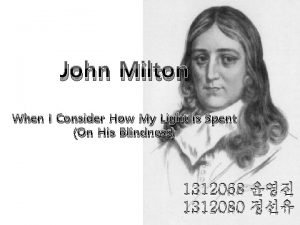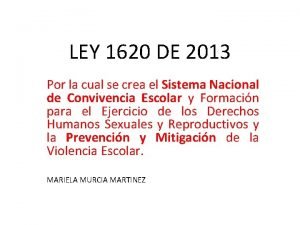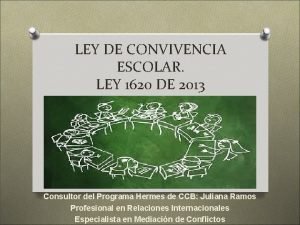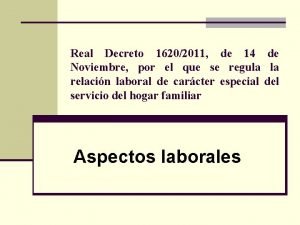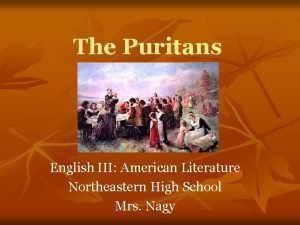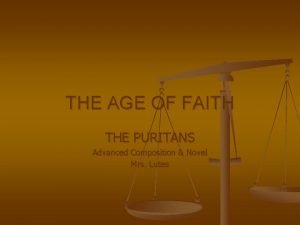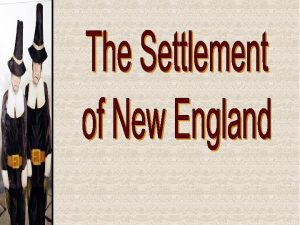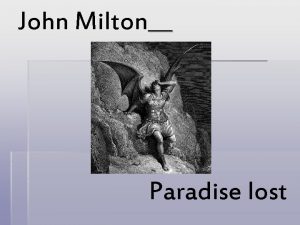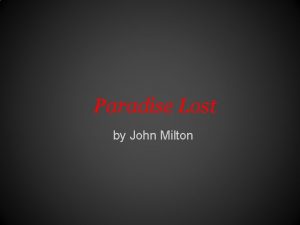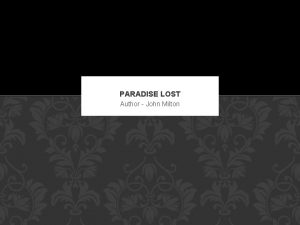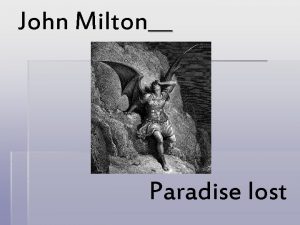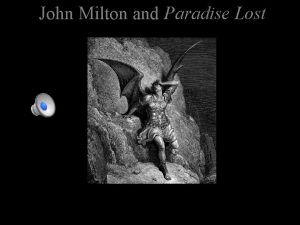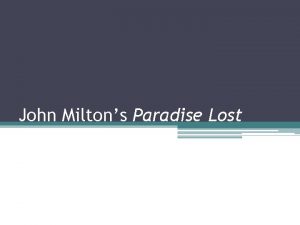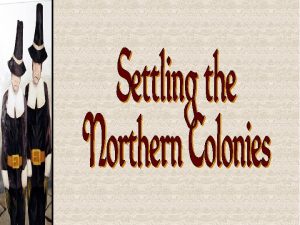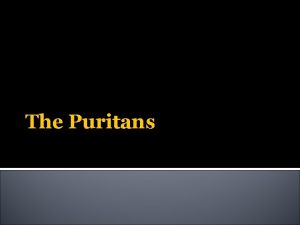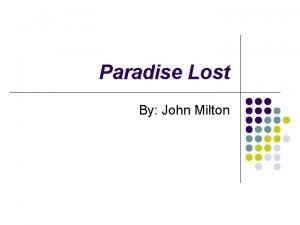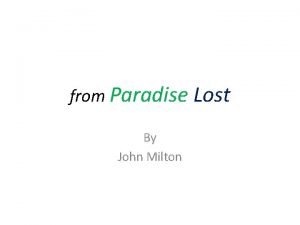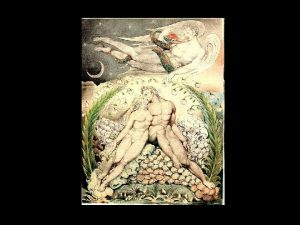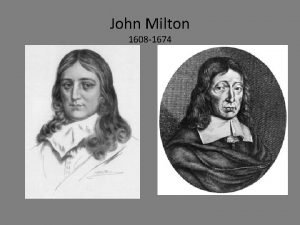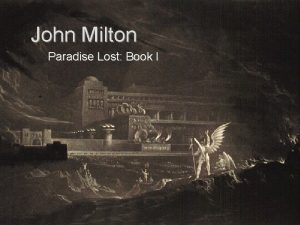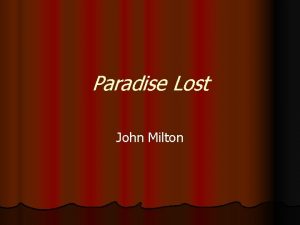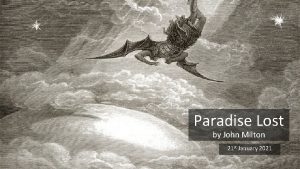John Milton PURITANS and Paradise Lost 1620 The







































- Slides: 39

John Milton, PURITANS, and Paradise Lost

• 1620 The "Pilgrims, " Puritan Separatists who had fled to the Netherlands, sail to America and found colony at Plymouth, Massachusetts

Difference between Puritans & Anglicans (Church of England) • Anglicans used stained glass windows, statues, music, and incense as aids to worship • Puritans did not – hundreds and hundred of dissenters from the Church of England (Anglicans) were imprisoned for their beliefs

What was Milton really like? • He rejected predestination (important to Puritans) • He advocated self-esteem and a just pride in personal virtue • His God was rational, and sometimes even identified with Reason itself • He treated polytheistic mythology with the same respect as Christianity and often seems to prefer Orpheus to Jesus

Milton’s Private Life • Later declared that “exposure to temptation was necessary” in order to become virtuous


When I consider how my light was spent • http: //www. bing. com/videos/search? q=when+i+consider+how+my+light+was+spent&qs=HS&form=QBVR &pq=when+i+&sc=87&sp=1&sk=#view=detail&mid=C 069 B 7 BFFCF 7 E 5802 DA 3


. . Paradise Lost is an epic poem which—like the epic poems of Homer, Dante, Vergil, and Goethe —tells a story about momentous events while incorporating grand themes that are timeless and universal.

• . . . . Milton used the Bible, Homer's Iliad and Odyssey, Vergil's Aeneid, and the stories in Greco-Roman mythology as sources of information and as writing models. • The Bible's Book of Genesis is the main source for his retelling of the story of creation and the first humans, Adam and Eve.

Settings: . . . . The settings are heaven, hell, the firmament (Chaos), and earth.

Characters: • God the Father, God the Son: • Two of the three divine persons making up the allpowerful Godhead, the single deity that created and rules all that exists outside of itself. • The third divine person, the Holy Spirit, does not play a role in Paradise Lost. • God the Father is portrayed as just but merciful, condemning the defiant and unrepentant rebel angels but permitting redemption of the repentant Adam and Eve. God the Son volunteers to redeem them by becoming human and enduring suffering and death.

Characters • Satan (Lucifer, Archfiend): Powerful and prideful angel who, with legions of supporters, leads an unsuccessful rebellion against God and suffers eternal damnation. • To gain revenge, he devises a plan to corrupt God's newly created beings, Adam and Eve, through deceit. • Modern readers often admire him for his steely defiance. • He would rather rule in hell, he says, than serve in heaven. • It was not Milton's intent, however, to create an admirable character; rather his intent was to create a character of colossal hatred—loathsome, execrable, incurably remorseless.

Characters • Adam and Eve: The first human beings, created by God to fill the void that resulted when God cast Satan and his supporters out of the celestial realm. • Adam and Eve live on the planet earth in utter happiness in a special garden where spring is the only season and love and godly living prevail. • Though they have all that they want and need, cunning Satan tells them they can have knowledge and status beyond their reach if only they eat of the fruit of the Tree of Knowledge. • Eve can become a goddess, he says. • Vanity overtakes her. She eats. Adam reluctantly does the same.

Characters • Gabriel, Raphael, Michael, Uriel: Powerful and fearless angels on the side of God. • Beelzebub, Mammon, Belial, Moloch: Powerful leaders in Satan's army. In a great council in hell, each of them speaks his mind on what policy devil-kind should follow after losing paradise. Should they make new war? Should they make peace?

Characters • Ithuriel, Zephron: Angels who expel Satan from the Garden of Eden with the help of a sign from God. Satan returns to the garden later to complete his devious enterprise. • Mulciber: Fallen angel who designs hell's capital city and seat of government, Pandemonium. In ancient Roman mythology, Mulciber is another name for Vulcan (Greek: Hephaestus), god of fire and the forge. As a blacksmith, he kept shop in burning mountains (volcanoes).

Characters • Sin: Daughter of Satan. • She was born from his head in the manner of Athena, Greek goddess of wisdom and war, who sprang from the forehead of Zeus, king of the gods. • Death: Son of Satan and Sin

Milton's Solar System • . . . . In describing the planets and other celestial bodies, Milton models God’s creation on the Ptolemaic design (also called the geocentric design) rather than the Copernican design (also called the heliocentric design). • Milton was aware of the Copernican theory, but he used the Ptolemaic design—either because he believed it was the more credible theory or because he believed it would better serve his literary purpose. • In Paradise Lost, Adam inquires about the movements of celestial bodies—in particular, whether earth orbits the sun or vice versa—in his conversation with the archangel Raphael, but Raphael gives no definite answer. • Raphael may have been speaking for Milton.

Style and Verse Format • Milton wrote Paradise Lost in dignified, lofty, melodic English free of any colloquialisms and slang that would have limited the work's timeliness and universality. • The format, Milton says in an introductory note, is "English heroic verse without rhyme"—in other words, blank verse, the same verse form used by Shakespeare in his plays. .

Style and Verse Format • . . . . Milton's strong religious faith infuses the poem with sincerity and moral purpose, but he does not allow his enthusiasm for his subject to overtake control of his writing. • Though Milton frequently uses obscure allusions to mythology and history, as well as occasional difficult words and phrases, his language is never deliberately affected or ostentatious.

Style and Verse Format • . . . . With a good dictionary and an annotated text, a firsttime reader of Milton can easily follow and understand the story while developing an appreciation for the exquisite writing.

Paradise Lost: Intentional Epic • Milton intentionally wrote in the centuries-old epic style: The Reason of Church Government: Milton declares his desire to write a great work that will serve to glorify England as earlier poets had glorified their native lands and cultures: "what the greatest and choycest wits of Athens, Rome, or modern Italy, and those Hebrews of old did for their country, I in my proportion with this over and above of being a Christian, might doe for mine“. • He declares his intention to write in English rather than another language such as Latin, and then ponders what genre to adopt: epic, tragic, or

Characteristics of Epic • In deciding to write an epic, Milton consciously places himself in the tradition of prior epic writers, such as the ancients Homer and Virgil, and the Medieval and Renaissance poets Dante. . . and Spenser. • By doing this, he raises specific sets of expectations both for himself and for readers. • it begins in medias res; • it concerns heavenly and earthly beings and the interactions between them; • it uses conventions such as epic similes, catalogues of people and places, • and invocations to a muse; • and it contains themes common to epics, such as war, nationalism, empire, and stories of

• . . . . (1) The invocation of the muse, in which a writer requests divine help in composing his work.

• . . . . (2) Telling a story with which readers or listeners are already familiar; they know the characters, the plot, and the outcome. • Most of the great writers of the ancient world—as well as many great writers in later times, including Shakespeare—frequently told stories already known to the public. • Thus, in such stories, there were no unexpected plot twists, no surprise endings. • If this sounds strange to you, the modern reader and theatergoer, consider that many of the most popular motion pictures today are about stories already known to the public. • Examples are The Passion of the Christ, Titanic, The Ten Commandments, Troy, Spartacus, Pearl Harbor, and Gettysburg.

• . . . . (3) Beginning the story in the middle, a literary convention known by its Latin term in media res (in the middle of things). • Such a convention allows a writer to begin his story at an exciting part, then flash back to fill the reader in on details leading up to that exciting part.

• . . . . (4) Announcing or introducing a list of characters who play a major role in the story. • They may speak at some length about how to resolve a problem (as the followers of Satan do early in Paradise Lost).

• . . . . (5) Conflict in the celestial realm. • Divine beings fight and scheme against one another in the epics of Homer and Vergil, and they do so in Paradise Lost on a grand scale, with Satan and his forces opposing God and his forces.

• . . . . (6) Use of dramatic irony. Dramatic irony is a literary device in which a character in a story fails to see or understand what is obvious to the audience or readers. • Dramatic irony appears frequently in the plays of the ancient Greeks. For example, in Oedipux Rex, by Sophocles, dramatic irony occurs when Oedipus fails to realize what the audience knows—that he married his own mother. • In Paradise Lost, dramatic irony occurs when Adam and Eve happily go about daily life in the Garden of Eden unaware that they will succumb to the devil's temptation and suffer the loss of Paradise. • Dramatic irony also occurs when Satan and his followers fail to understand that it is impossible ultimately to thwart or circumvent divine will and

Who is the epic hero? • Is Satan the hero? • "by measuring Satan against the heroic standards, we become conscious of the inadequacy and fragility of all the heroic virtues celebrated in literature, of the susceptibility of them all to demonic perversion. ”

Angels gone wrong

Satan rouses Beelzebub

Fallen Angels Roused

Pandemonium

Satan Hurled from Heaven

Temptation

Creation

Expulsion from Paradise

Reading Outline • http: //nerdgirlreadwhat. bl ogspot. com/2013/03/lineby-line-outline-ofparadiselost. html#!/2013/03/lineby-line-outline-ofparadise-lost. html
 Summary of paradise lost by john milton
Summary of paradise lost by john milton Language font style
Language font style In the poem what does satan vow
In the poem what does satan vow Lost sheep lost coin lost son
Lost sheep lost coin lost son Frankenstein and paradise lost
Frankenstein and paradise lost Sin and death in paradise lost
Sin and death in paradise lost Jeremy le van
Jeremy le van Once was lost now i'm found
Once was lost now i'm found Paradise lost analysis
Paradise lost analysis Paradise lost theme
Paradise lost theme Context of paradise lost
Context of paradise lost Albrecht durer paradise lost
Albrecht durer paradise lost Context of paradise lost
Context of paradise lost Surprised by sin the reader in paradise lost
Surprised by sin the reader in paradise lost Samuel paradise hotel
Samuel paradise hotel Albrecht durer paradise lost
Albrecht durer paradise lost Of man's first disobedience summary
Of man's first disobedience summary Paradise lost date
Paradise lost date Puritan age in english literature
Puritan age in english literature Paradise lost in cyberspace
Paradise lost in cyberspace Samuel johnson on paradise lost
Samuel johnson on paradise lost Paradise lost review
Paradise lost review Paradise lost background
Paradise lost background John milton life and works
John milton life and works John milton drama
John milton drama ترجمة قصيدة on his blindness
ترجمة قصيدة on his blindness John milton early life
John milton early life On his blindness quiz
On his blindness quiz Puritan ideals
Puritan ideals On the late massacre in piedmont summary
On the late massacre in piedmont summary John milton when i consider
John milton when i consider Ley 1620
Ley 1620 Ley 1620 de 2013 situaciones tipo 1 2 y 3
Ley 1620 de 2013 situaciones tipo 1 2 y 3 San mateo 28 1620
San mateo 28 1620 Ley 1620 de 2013 doc
Ley 1620 de 2013 doc Rd 1620/2011
Rd 1620/2011 Puritans beliefs
Puritans beliefs Puritan beliefs
Puritan beliefs Separatists
Separatists Separatists vs non separatists
Separatists vs non separatists

